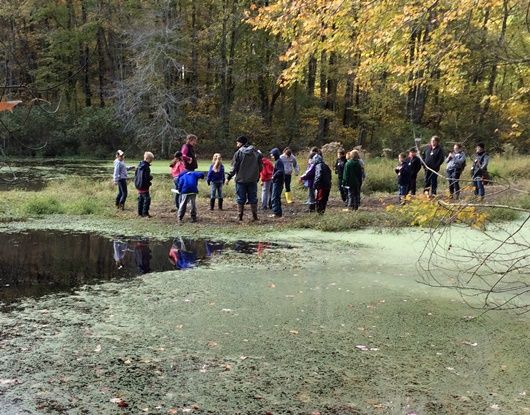ECOSYSTEMS

Ecosystem Investigation
Duration: 1 - 1½ hours
Grade Level: 3rd - 12th
Standards: 4.1.4, 4.1.7, 4.1.10, 4.1.12, 4.6.4, 4.6.7, 4.6.10, 4.7.7, 4.7.10, 4.8.4, 4.8.7, 2.3.5
The ecosystem concept is explored through this hiking activity. Students visit 4 to 6 different ecosystems and collect data about air and soil temperatures, sunlight penetration, wind speed, and biological factors. The data collected is used to investigate the inter-relatedness of ecosystems. Learning about wetlands and visiting a marsh are highlights of this activity.
Forest Comparison
Duration: 1¼ - 1½ hours
Grade Level: 4th - 12th
Standards: 4.7.10, 4.7.12, 3.1.4, 2.3.5
Students work in pairs to collect data on soil texture, temperature, soil pH, sunlight penetration, tree types, and plant densities in a deciduous and a coniferous forest. Students compare the data to explore how forests differ.
Marsh Investigation
Duration: ¾ - 1 hour
Grade Level: 3rd - 12th
Standards: 4.1.4, 4.1.7, 4.6.4, 4.6.7, 4.6.10, 4.7.7, 4.7.10, 4.7.12, 4.8.4, 4.8.7
Most people often avoid wetlands. In this activity, students experience a wetland (in this case a marsh) and compare it with a forest. They learn about the role that wetlands play in water quality and as important habitat.
Healthy Forests
Grade Level: 4th - 12th
Standards: 3.1.4.C1, 3.2.4.A1, 4.1.4.A, 4.1.4.B, 4.1.5.A, 4.1.7.D, 4.1.12.A, 4.3.4.A, 4.3.10.A, 4.5.4.C, 4.5.7.C.
Forests are incredibly diverse and complex ecosystems. Students learn how the plants and animals
in a forest are interrelated and about the different layers in a forest. Students also measure trees to figure out their age and how much carbon dioxide they sequester. All of these factors help students determine how healthy a forest is.
Pond Study
(see Water section)
Stream Investigation
(see Water section)
